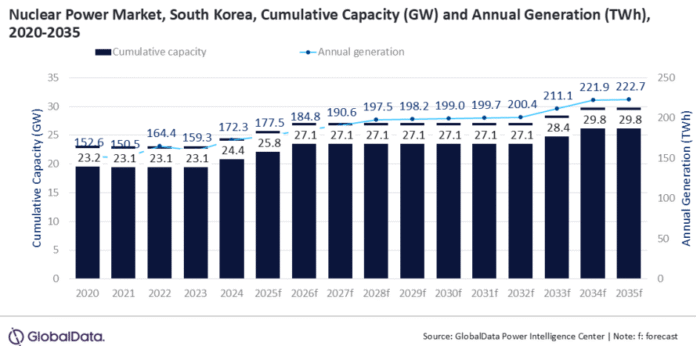South Korea is intensifying its reliance on nuclear power to meet its electricity demands as the country lacks interconnections with neighboring grids and does not import or export electricity.
According to GlobalData’s latest report, “South Korea Power Market Outlook to 2035, Update 2025 – Market Trends, Regulations, and Competitive Landscape,” nuclear generation is expected to grow steadily, reaching 222.7 terawatt-hours (TWh) by 2035 — reflecting a compound annual growth rate (CAGR) of 2.4 percent between 2024 and 2035.
The country reversed its nuclear phase-out policy in 2022, making atomic energy a core component of its long-term energy strategy. Nuclear capacity in South Korea has grown from 23.2 gigawatts (GW) in 2020 to 24.4GW in 2024 and is projected to rise further to 29.8GW by 2035, at a CAGR of 1.8 percent. The country currently operates 25 reactors, with four more under construction.
“Nuclear power already accounts for nearly one-third of South Korea’s electricity consumption,” said Attaurrahman Ojindaram Saibasan, Senior Power Analyst at GlobalData. “With no domestic fossil fuel reserves, South Korea faces high import costs for coal and gas, making nuclear a critical option for energy security and emissions reduction.”
South Korea’s energy security was tested in 2012 when two reactors were shut down over faulty components, pushing reserve margins below 10 percent amid rising electricity demand. The experience underscored the importance of a stable and resilient nuclear infrastructure.
Under the 11th Basic Plan for Long-Term Electricity Supply and Demand, the government aims to increase the share of nuclear power in total electricity generation to 35.2 percent by 2038. This will involve the addition of three large-scale reactors and one small modular reactor (SMR), collectively boosting capacity by 4.4GW.
Beyond domestic goals, South Korea is also expanding its international nuclear ambitions. The country plans to secure contracts for building 10 nuclear reactors abroad by 2030. South Korean firms have already made inroads with projects in the Czech Republic and the successful completion of the Barakah nuclear plant in the United Arab Emirates.
However, the political landscape presents fresh uncertainty. The impeachment of President Yoon Suk-yeol in April 2025 has raised questions about the future of nuclear policy. “Policy direction could shift depending on the outcome of upcoming elections,” Saibasan noted.
Despite this, South Korea’s long-term strategy positions nuclear power as a key player for both energy independence and climate mitigation.
GreentechLead.com News Desk

